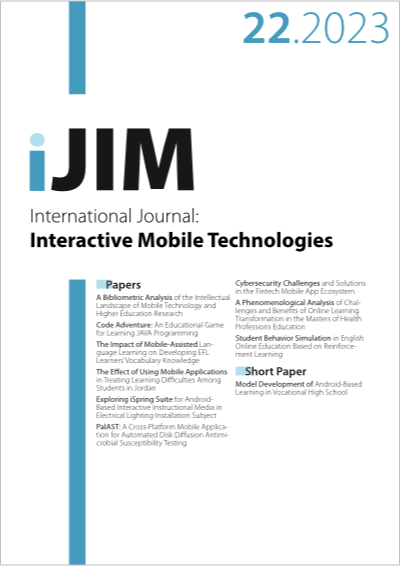A Phenomenological Analysis of Challenges and Benefits of Online Learning Transformation in the Masters of Health Professions Education
DOI:
https://doi.org/10.3991/ijim.v17i22.41417Keywords:
Transformation, Distance learning, Master in Health Professions Education, Phenomenological Design, Thematic Analysis, NVIVOAbstract
Learning that challenges preconceived notions and inspires the development of fresh perspectives on the world has been referred to as transformative learning. This study offers a thorough analysis of how changes in learning have been reflected, including how they have an impact on curricula, in order to guide the master of health professions education’s potential field applications. Through purposive sampling, 15 students of MHPE from Islamic International Medical College, Rawalpindi, Pakistan have been chosen. The study design is phenomenological in nature. A semi-structured interview has been used. All the interviews were audio-recorded and separately transcribed. The transcribed interviews were then imported into NVivo software version 11 for analysis. A thematic analysis has been done and six themes are generated. The applications of distance learning positively related to teaching and learning practices and students identified a change in their attitudes toward distance learning. Major factors recognized were student-centered learning, small group discussions, peer-assisted learning, technology awareness, personal grooming, and motivation. About three-fourths of the sample population experienced a transformation in their distance learning after going through a Master’s in Health Professionals Education. The impact of hands-on activities and small group discussions turned out to be the strongest factors that caused the transformation in distance learning.
Downloads
Published
How to Cite
Issue
Section
License
Copyright (c) 2023 Asiya Zahoor, Dr Fozia Fatima, Dr. Faiza Kiran, Muhammad Imran Hanif, Dr. Safia Fatima, Sabir Ali, Dr. Rehan Ahmad Khan

This work is licensed under a Creative Commons Attribution 4.0 International License.



